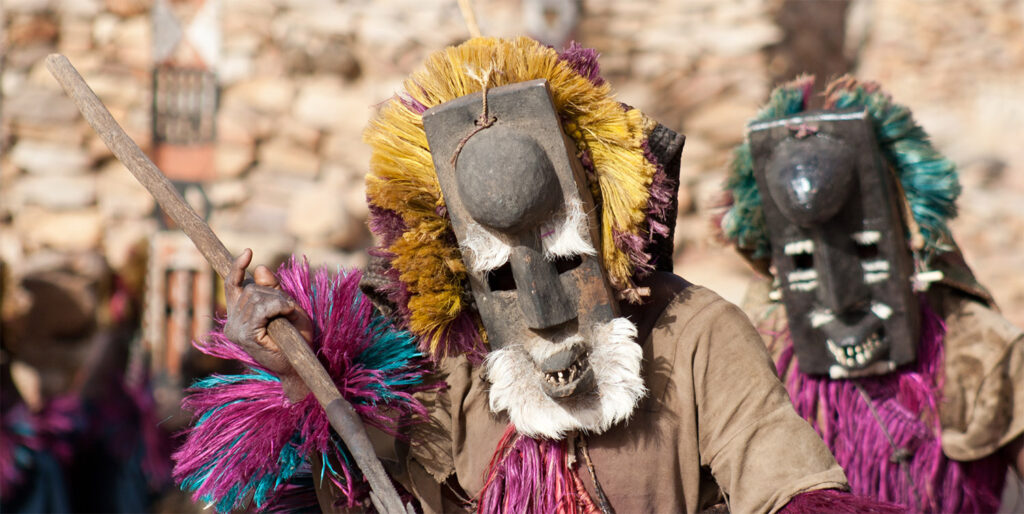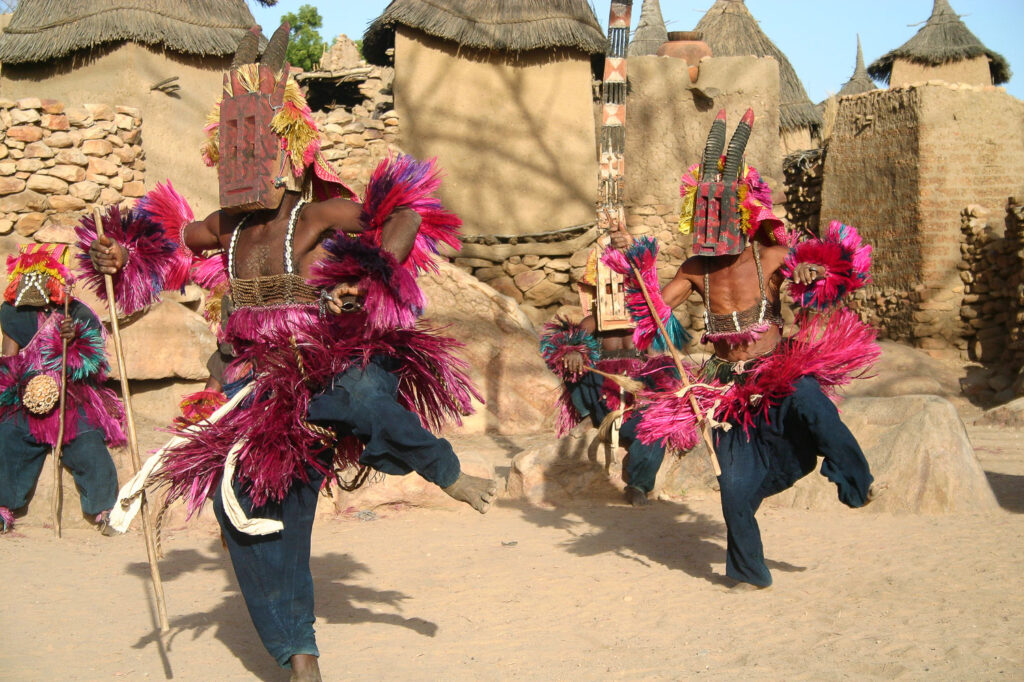The Dogon tribe is an ethnic group found in the central plateau region of Mali and Burkina Faso, in West Africa with about 500,000 to 800,000 indigenes.
The Dogon tribe are famous for their unique religious beliefs, wooden sculptures, mask dances, and distinctive architecture.
However, their traditional way of life has been influenced by the modern world, and there have been significant changes in their social organization, beliefs, and material culture, partly due to the increasing number of tourists visiting the area.
They speak the Dogon language, which is a distinct branch of the Niger-Congo language family and is not closely related to any other language.
In this article, we will delve into the history and traditions of the Dogon tribe, and explore the fascinating beliefs and practices that have made them a subject of fascination for people around the world.
History of the Dogon Tribe
The history of the Dogon tribe is shrouded in mystery and legend. According to oral tradition, the Dogon people were originally from the ancient kingdom of Mande, which encompassed parts of modern-day Guinea, Senegal, and Mali.
The Dogon tribe are believed to have migrated to their current location in Mali around the 15th century, and established several settlements in the Bandiagara Escarpment, a sandstone cliff that stretches for over 150 km.
The Dogon people were originally animists, worshipping a pantheon of deities that were believed to inhabit natural objects such as rocks, trees, and animals.
However, during the 15th century, the Dogon were exposed to Islam through trade and missionary activities, and many converted to the new religion.

The Dogon Tribe Of Africa is known for their ancient stories about human origins and extraterrestrial contact. According to legend, the Nommo race came from the Sirius star system thousands of years ago and visited Earth to share knowledge with humans. These creatures are also mentioned in Babylonian and Sumerian mythology.
What’s interesting is that the Dogon possessed knowledge for centuries that was unknown to the western world until Galileo and his telescope.
They knew about Jupiter’s moons and Saturn’s rings, and believed that the Sun was at the center of our solar system. They also had tales about cosmic events, including a huge explosion.
In addition, the Dogon had knowledge of an invisible star orbiting Sirius that was only discovered by modern astronomers in the 1970s.
This has led some to speculate that the Dogon had contact with an advanced alien civilization, while others suggest that they may have acquired this knowledge through observation and oral tradition.
Culture and Traditions of the Dogon Tribe
The Dogon religion was recorded by French anthropologists Marcel Griaule and Germaine Dieterlen during the 1930s and 1940s.
Griaule was taught about the religion’s main symbols and religious stories by a blind Dogon elder named Ogotemmeli in October 1946.
Ogotemmeli had learned the stories through oral instruction, which he had learned over the course of more than twenty years from his father and grandfather.

The Dogon people had a system of signs, including their own systems of astronomy and calendrical measurements, methods of calculation, extensive anatomical and physiological knowledge, as well as a systematic pharmacopoeia.
The religion embraced many aspects of nature that are found in other traditional African religions. The key spiritual figures in the religion were the Nummo/Nommo twins, who were symbolized by the Sun, which was a female symbol in the religion.
The Dogon religion was centered on the loss of twinness or androgyny, and circumcision and excision were remedies for this loss.
The birth of human twins was celebrated in the Dogon culture because it recalled the “fabulous past, when all beings came into existence in twos, symbols of the balance between humans and the divine.”
Despite their conversion to Islam, the Dogon people have retained many of their traditional beliefs and practices.
The Dogon culture is characterized by its emphasis on communal living, with extended families living together in compounds that are arranged around a central courtyard.
Each compound is surrounded by a wall, and the only entrance is through a small gate that is designed to keep out wild animals and intruders.
The Dogon people are also known for their intricate carvings, which are made from wood, metal, and other materials. These carvings depict a wide range of subjects, including animals, ancestors, and mythological beings.
Mythology and Cosmology
One of the most fascinating aspects of the Dogon culture is their rich mythology and cosmology. The Dogon people have a complex system of beliefs that is based on their observation of the natural world and the movements of the stars and planets.
According to Dogon mythology, the universe was created by a divine being known as Amma, who fashioned the world out of a chaotic mass of matter.
Amma is believed to have created eight primordial beings known as Nommo, who were the ancestors of the Dogon people.
The Nommo were said to have come to Earth in a vessel that was shaped like a serpent, and they brought with them the knowledge of the cosmos and the secrets of the universe.
The Dogon tribe are also renowned for their knowledge of astronomy and cosmology. The Dogon have a deep understanding of the movements of the stars and planets, and they have identified several celestial bodies that were not discovered by Western astronomers until centuries later.
One of the most remarkable examples of the Dogon’s astronomical knowledge is their understanding of Sirius, the brightest star in the night sky.
The Dogon have known about Sirius for thousands of years, and they have identified it as a binary star system, with a smaller star orbiting around a larger one. This was a discovery that was not confirmed by Western astronomers until the mid-19th century.
Marriage
The Dogon people mostly have monogamous marriages, but they allow some men to have multiple wives.
Usually, a man only has two wives at most and each wife lives in a different house in the husband’s compound.
The first wife has a higher status than any later wives. The man’s parents choose the wife for him, and marriages are only allowed within the same clan and caste.
If a woman leaves her husband before having children, it is not a big deal. However, divorce is rare after having children and requires the whole village’s involvement.
Polygynous marriages are more likely to end in divorce than monogamous ones. If a divorce happens, the woman only takes the youngest child, and the rest stay with the husband.
The Dogon value harmony and show it in their rituals. They have a greeting ritual where people ask about each other’s families, and the answer is always “everything is fine.” This is why they are called the “sewa people” by their neighboring communities.
Languages
The Dogon language is not a single language but a collection of at least 12 dialects and 50 sub-dialects.
There is also a secret ritual language called sigi sǫ that is only taught to certain people. The Dogon language is believed to be part of the Niger-Congo language family, but it is still uncertain.
The language does not have a unique noun class system and has a subject-object-verb word order. The Bangime language spoken by some Dogon people is not related to other Dogon languages and is believed to be an ancient language isolate.
Interesting facts about the Dogon Tribe
- They have ceremonies related to agriculture and death. They have masked men who dance for days to harvest their crops or mourn the death of loved ones.
- The main spirits revered by the Dogon people are the Nummo twins. They believe that Nummo is an amphibian that represents the sun and is androgynous. They mourn the loss of their twins and believe that they haunt them.
- Dogon houses are built on two levels and decorated with decorative elements to describe the type of family that lives inside. They usually have no windows and are built-in banco.
- The Dogon Tribe developed the Toro So language, but not many Dogon speak it. Some communicate in popular languages such as Jambay and Tommo.
- They refused to completely convert to Islam when it was introduced in the 15th century. Those who refused migrated to the cliffs with other non-repentant villagers and formed the Dogon tribe.
- The Dogon Tribe Of Africa is known for their craftsmanship, particularly in making sculptures of people, dogs, snakes, and others. They often use them in altars and near their homes, believing that the paintings will protect them.
- The Dogon tribe has advanced cosmic knowledge surrounding the star of Sirius. They believed in the presence of the ring of Saturn and the moons of Jupiter before telescopes and modern technologies existed.
- A Hogon is a spiritual leader who is usually chosen from among the oldest male members of the family in large groups. During his first six months, the Hogon does not shave or wash his hair but is taken care of by a virgin. Hogon gives spiritual advice about fertility and performs marriage ceremonies.
- Traditional Dogon burial service ceremonies are interesting and often performed for tourists to make money. They dance while wearing veils, believing that the cover is instrumental in guiding the spirits of the dead into eternity. The covers differ in every town and the dance can last up to six days.
Conclusion
The Dogon tribe is a fascinating and enigmatic people, whose rich culture and mythology have captivated people around the world.
Despite their conversion to Islam and the pressures of modernization, the Dogon people have managed to retain many of their traditional beliefs and practices, and their knowledge of astronomy and cosmology continues to inspire and amaze people to this day.
Also read: 10 Smallest Tribes In Africa
If you are interested in learning more about the Dogon tribe, there are many resources available online and in books.
Source
https://en.wikipedia.org/wiki/Dogon_people
https://africafactszone.com/dogon-tribe-of-africa/

